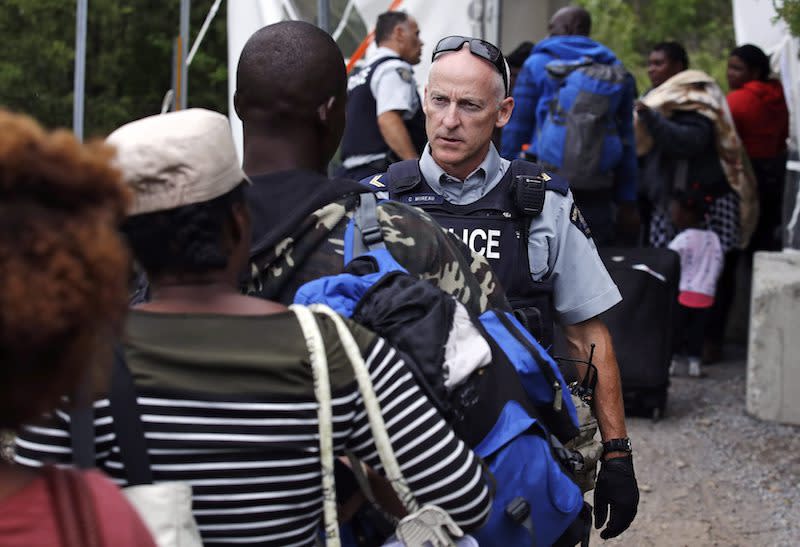VOTE: Should illegal Canada border crossers receive free health care?

What should happen to an asylum seeker who illegally crosses the border into Canada only to discover he has cancer? The answer depends on who you ask.
Consider the case of Taha El Taha, a 36-year-old stateless Palestinian who fled Lebanon before crossing into Quebec from New York last December. His story was first reported on by Global News in early May and has since got the attention of other Canadian news outlets.
After entering Canada, he was required to take a routine medical exam, which revealed he had terminal, stage four colorectal cancer that had spread to his abdomen and chest. He has since received several rounds of chemotherapy, according to Global News.
This week, it was reported by CBC Radio that El Taha would be joined by his wife and two young children as he receives medical treatment in Canada, as he is scheduled to have invasive cancer Thursday.
A special request –made directly to the federal immigration minister — allowed his wife and two children to join him in Canada on temporary resident visas while he receives care was approved, even though the previous application was denied, according to CBC Radio’s As It Happens.
“We were extremely happy to receive the good news,” immigration consultant Rami Alsaqqa said in a statement provided to CBC Radio.
There is a federal government program available that covers health care services for those in need.
“The Interim Federal Health Program (IFHP) provides limited, temporary coverage of health-care benefits to people in the following groups who aren’t eligible for provincial or territorial health insurance,” a government website states. This plan covers protected persons (including resettled refugees), refugee claimants and certain other groups.
Refugees are responsible for paying for their medical examination, travel documents and transportation costs to Canada, according to a government website.
As of March 2018, there were 48,974 pending refugee protection claims in Canada, according to government figures. That number is more than double what it was a year earlier in March 2017 (21,130) and more than triple the amount posted in March 2016 (11,798), the government statistics show.
The Canadian Press reported in 2017 the backlog of asylum claimants in Canada could prove costly. From 2017 to 2021, social supports for claimants — including education, social assistance and health care — could cost taxpayers $2.97 billion, according to a government memo. This figure is based on projections that of 36,000 claims in 2017, with 20-per-cent increases each year after.
‘This is not right’
El Taha told the CBC his life was in danger in Lebanon as members of Hezbollah burned down his house for refusing to work for them as an informant. He now says he feels like he’s finally in a safe country, and he applied for refugee status in Canada.
It appears El Taha is following the rule of law, except for the fact that he entered Canada illegally, like thousands of other asylum seekers. But reactions to El Taha’s story have been mixed. Some online commenters say he is jumping the queue and getting a free ride off the backs of taxpayers.
“His story, while tragic, highlights the profoundly problematic nature of the Trudeau Liberal government’s open door policy toward refugee claimants,” writes Toronto Sun columnist Mark Bonokoski.
“It’s an unfortunate story. But he came here illegally, I believe the right decision was made. Who is to say his family won’t get the same idea?” Lonnie Rose Kirkpatrick says on a Montreal Gazette Facebook page.
“This is not right. While it’s sad that he has cancer, there are lots of Canadians dealing with the disease as well. How does an illegal get treated so quickly while Canadians wait? While it would be nice to treat the worlds sick and needy, its just not sustainable,” Cathy Bowslaugh chimed in on Facebook.
Meanwhile, others insist the government is doing the right thing by covering the medical cost for someone in a dire situation.
“Thank you, Canada, for being an example of humanity and compassion,” Carolina Le Seria said on a CBC Facebook page.
“May I humbly suggest that in cases like these the golden rule applies: ‘Do unto others the same you would like to be done to you,'” wrote Giancarlo Cordero Ortiz.
“This is how the world should work,” Josh Marron replied on Facebook.
What do you think should happen to asylum seekers who illegally enter Canada? Do you think the federal government should cover their health care expenses until their claims are processed or is it time to stop footing the bill? Let us know what your take is by voting in the quiz above and sharing your opinion in the comment section below.


